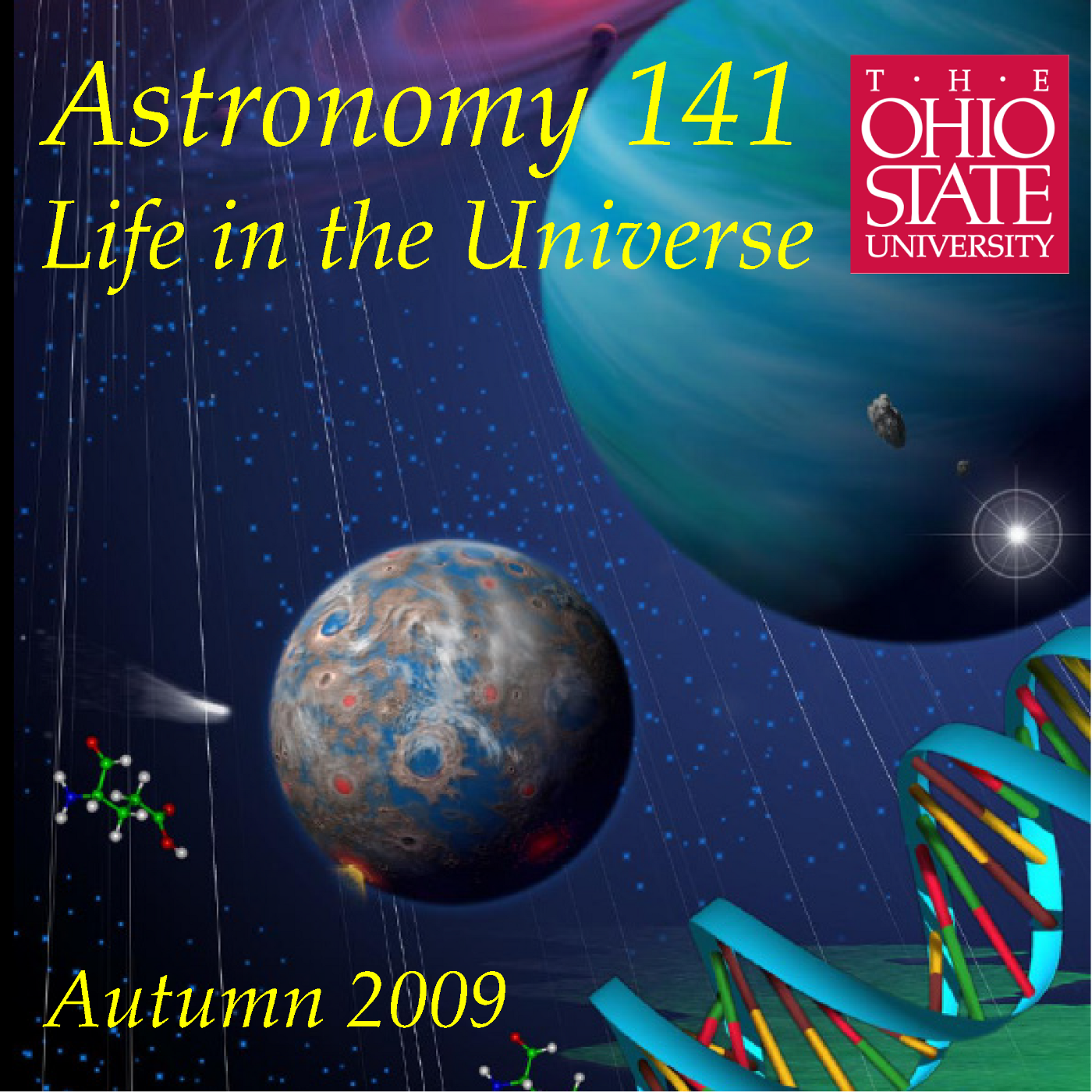Podcast Profile: Astronomy 141 - Life in the Universe - Autumn Quarter 2009
 Site • RSS • Apple Podcasts
Site • RSS • Apple Podcasts47 episodes
2009
Median: 46 minutes
Collection: Physics, Math, and Astronomy

 Site • RSS • Apple Podcasts
Site • RSS • Apple PodcastsDescription (podcaster-provided):
Astronomy 141, Life in the Universe, is a one-quarter introduction toThemes and summary (AI-generated based on podcaster-provided show and episode descriptions):
➤ Astrobiology overview • scientific method, measurement units • Earth geology, atmosphere, climate history • origin and evolution of life, cells, DNA, extremophiles • solar-system habitability, Mars/Europa/Titan • stellar evolution • exoplanets, biomarkers • SETI, Drake equation, Fermi paradoxThis podcast is a set of recorded university lectures that introduce astrobiology for non-science majors by building a scientific framework for thinking about “life in the universe.” It begins by establishing the tools and perspectives needed for the topic: how astronomers handle very large numbers and distances, and how cultural ideas about other worlds differ from testable scientific questions. From there, the lectures trace a series of major scientific revolutions—astronomical, chemical, geological, biological, and cosmological—to show how modern science developed the ability to measure time and matter, determine ages of planets and the universe, and infer physical conditions on worlds near and far.
A major thread is defining life in operational terms and identifying the environmental and chemical requirements that make life possible. The course examines life at multiple scales, from cells and metabolism to DNA, heredity, and evolution, with attention to why liquid water, energy sources, and complex chemistry matter. It also uses extremophiles and the early fossil and isotopic record to explore the possible limits of life and how quickly life may have appeared on Earth. The origin of life is treated as an open research problem, surveying experimental and conceptual approaches to abiogenesis and related hypotheses.
The podcast then applies these ideas to planetary environments, comparing Earth with other terrestrial planets and surveying the outer solar system, including moons that may harbor subsurface oceans or unusual chemistry. Habitability is explored through climate regulation, greenhouse effects, and the concept of habitable zones, including how planetary size and atmospheres affect long-term surface conditions.
Later lectures broaden the scope to stars and planets around other stars, covering stellar properties and lifetimes, the detection and diversity of exoplanets, and what measurements might reveal about Earth-like worlds and possible biosignatures. The course also addresses the search for intelligent life via the Drake Equation and SETI, the physical constraints on interstellar travel and colonization, and the implications of the Fermi Paradox. It concludes by considering the long-term future of habitability in the solar system and, on cosmological timescales, the prospects for life in an evolving universe.
| Episodes: |
|
Welcome to Astronomy 141 2009-Sep-23 |
|
Lecture 1: Introduction 2009-Sep-23 19 minutes |
|
Lecture 2: Astronomical Numbers 2009-Sep-24 43 minutes |
|
Lecture 3: Imagining Other Worlds 2009-Sep-25 40 minutes |
|
Lecture 4: The Copernican Revolution 2009-Sep-28 43 minutes |
|
Lecture 5: The Chemical Revolution and the Nature of Matter 2009-Sep-29 45 minutes |
|
Lecture 6: The Geological Revolution - Deep Time and the Age of the Earth 2009-Sep-30 46 minutes |
|
Lecture 7: The Biological Revolution - What is Life? 2009-Oct-01 44 minutes |
|
Lecture 8: The Cosmological Revolution - The Depths of Space and Time 2009-Oct-02 46 minutes |
|
Lecture 9: Inside the Earth 2009-Oct-05 42 minutes |
|
Lecture 10: The Earth's Atmosphere Erratum 2009-Oct-06 1 minute |
|
Lecture 11: The History of the Earth 2009-Oct-07 42 minutes |
|
Lecture 12: Climate Regulation and Climate Change 2009-Oct-08 45 minutes |
|
Lecture 13: What is Life? 2009-Oct-12 46 minutes |
|
Lecture 14: Cells 2009-Oct-13 45 minutes |
|
Lecture 15: The Chemistry of Life 2009-Oct-14 45 minutes |
|
Lecture 16: DNA and Heredity 2009-Oct-15 46 minutes |
|
Lecture 17: Life on the Edge 2009-Oct-16 46 minutes |
|
Lecture 18: The First Living Things on Earth 2009-Oct-19 46 minutes |
|
Lecture 19: The Origin of Life on Earth 2009-Oct-20 46 minutes |
|
Lecture 20: The History of Life on Earth 2009-Oct-21 47 minutes |
|
Lecture 21: Impacts and Extinction 2009-Oct-22 46 minutes |
|
Lecture 22: The Family of the Sun 2009-Oct-26 46 minutes |
|
Lecture 23: Terrestrial Worlds in Comparison 2009-Oct-27 46 minutes |
|
Lecture 24: The Jovian Planets 2009-Oct-28 47 minutes |
|
Lecture 25: The Requirements for Life in the Solar System 2009-Oct-29 47 minutes |
|
Lecture 26: The Deserts of Mars 2009-Oct-30 47 minutes |
|
Lecture 27: Is There Life on Mars? 2009-Nov-02 47 minutes |
|
Lecture 28: The Galilean Moons of Jupiter 2009-Nov-03 44 minutes |
|
Lecture 29: The Children of Saturn 2009-Nov-04 46 minutes |
|
Lecture 30: Goldilocks and the Three Planets 2009-Nov-05 46 minutes |
|
Lecture 31: The Properties of Stars 2009-Nov-09 46 minutes |
|
Lecture 32: The Lives of Stars 2009-Nov-10 46 minutes |
|
Lecture 33: The Deaths of Stars 2009-Nov-12 47 minutes |
|
Lecture 34: Habitable Zones around Stars 2009-Nov-13 47 minutes |
|
Lecture 35: The Solar Neighborhood 2009-Nov-16 46 minutes |
|
Lecture 36: Exoplanets - Planets Around Other Stars 2009-Nov-17 47 minutes |
|
Lecture 37: Strange New Worlds 2009-Nov-18 46 minutes |
|
Lecture 38: The Pale Blue Dot - Seeking Other Earths 2009-Nov-19 44 minutes |
|
Lecture 39: The Drake Equation 2009-Nov-23 45 minutes |
|
Lecture 40: SETI - The Search for Extra-Terrestrial Intelligence 2009-Nov-24 46 minutes |
|
Lecture 41: Interstellar Travel and Colonization 2009-Nov-25 45 minutes |
|
Lecture 42: The Fermi Paradox 2009-Nov-30 44 minutes |
|
Lecture 43: Extraterrestrial Life 2009-Dec-01 45 minutes |
|
Lecture 44: The Future of Life in the Solar System 2009-Dec-02 55 minutes |
|
Lecture 45: The Future of Life in the Universe 2009-Dec-03 44 minutes |
|
Lecture 46: This View of Life (Course Finale) 2009-Dec-04 41 minutes |